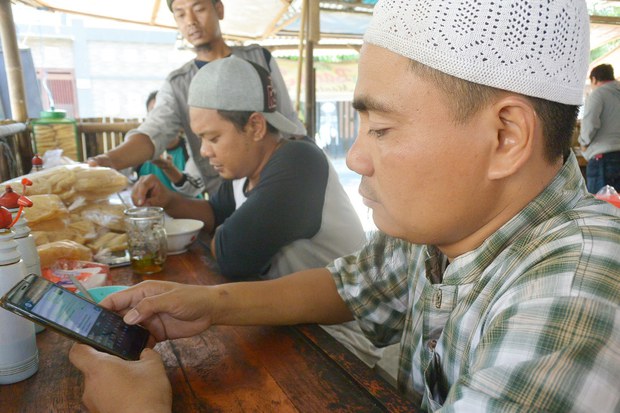On Path to Rehab Small Community of Ex-Indonesian Militants Bonds Via WhatsApp
2019.10.29
Solo, Indonesia
 Joko Tri Harmanto (right), a former Indonesian militant, checks messages on his mobile phone at his restaurant near Solo, Indonesia, Oct. 23, 2019.
Joko Tri Harmanto (right), a former Indonesian militant, checks messages on his mobile phone at his restaurant near Solo, Indonesia, Oct. 23, 2019.
A former Indonesian terrorist has started a WhatsApp group to foster dialogue and community among fellow ex-militants who are trying to reintegrate into society, but some occasionally still exchange radical views, according to a corrections officer who monitors their messages.
Joko Tri Harmonto, 41, is the founder of the messaging group whose members include 35 former inmates who served terrorism-related terms and five corrections officers working with them to get their lives back on track. He was sentenced in 2004 to six years in prison for helping assemble explosives used in the 2002 Bali Bombings – Indonesia’s deadliest terrorist attack, which killed 202 people.
“I don’t think we want to commit an act of terrorism again. Like me, they want to focus on their families and jobs,” Joko, who was freed on parole in 2008 and owns a restaurant near Solo, Central Java, told BenarNews, referring to his fellow chat group members.
He launched the WhatsApp group two years ago and started a foundation that supports ex-terrorist convicts in their path back into society through a program that trains them to have business skills.
Kristin Yuniastuti, one of the parole officers who work as counselors for ex-terrorism convicts in Solo city as part of a rehabilitation program run by Indonesia’s Ministry of Law and Human Rights, is a member of the chat group.
She has observed some former convicts disseminate radical content or opinions via the platform. Members sometimes share unsubstantiated and inflammatory content, such as reports about Muslims being attacked and calls to fight Indonesia’s “tyrannical” government, she said.
Kristin said she did not believe this indicated that the ex-convicts were returning to their old militant ways.
“Their ideology is never gone and at times they let it show,” she told BenarNews.
“But they will think a thousand times if they want to commit an act of terrorism and risk going to jail again,” she said, adding that their ideological fervor fluctuated.
Kristin said that she and the four other counselors from the corrections office in Solo joined the WhatsApp group because eight of the former convicts who belong to it were under their supervision.
![191028_ID_terrorist_whatsapp_inside.jpg Indonesian parole officer Kristin Yuniastuti discusses her efforts to mentor terrorism convicts in Central Java province, during an interview in Solo, Oct. 21, 2019. [Kusumasari Ayuningtyas/BenarNews]](/english/news/indonesian/chat-group-10292019145807.html/191028_ID_terrorist_whatsapp_inside.jpg/@@images/73cdc24b-81bb-4f92-9aa2-424f4c3bea8f.jpeg)
Kristin said she would not be drawn into heated discussions on the WhatsApp group or directly reprimand members for posting radical content or fake news.
“They sometimes show their antipathy for us. At times when they had started to open up, they withdrew again because of the debate in the group,” she said.
The three other correctional officers working with Kristen declined to be interviewed.
Yusuf Adirima, a chat group member who was convicted in 2004 of possessing explosives for terrorist purposes and was released in 2009, admitted that he sometimes shared posts related to jihad.
“Even if there are posts calling for jihad, usually there will be a light-hearted reprimand, so there is no fuss,” said Yusuf, who today runs a restaurant.
In Jakarta, Lenggono Budi, who directs the correctional supervision office at the Ministry of Law, said he was not aware of the WhatsApp group created by Joko, who is also known as Jack Harun.
“There’s no prohibition for them to communicate via WhatsApp, but of course we’re concerned,” Lenggono told BenarNews, responding to a question about alleged radical content and fake news appearing in post among chat group members.
Handling Bahrun Naim
Earlier in Kristin’s career as a corrections officer, she was assigned to supervise the parole of Muhammad Bahrunnaim Anggih Tamtomo (alias Bahrun Naim), after he had served two years in prison for hiding a cache of bullets. But after his release in 2012, he became involved in terrorist activities and left Indonesia to join the Islamic State (IS) extremist group in Syria.
According to Indonesian and American officials, Bahrun Naim became a financier of terror networks in Indonesia and a master recruiter, who convinced at least 100 of his countrymen to join IS. He also allegedly groomed women to become suicide bombers.
The U.S. government alleged that he organized and funded a terrorist attack, which killed four civilians and four extremists in central Jakarta on Jan. 14, 2016. The attack was the first terrorist act claimed by IS in Indonesia.
Kristin declined to discuss her past interaction with Bahrun Naim, who was killed in a U.S. airstrike in Syria last year, according to U.S and Indonesian officials.
“Those convicted in terrorism cases need a special approach,” said Kristin, 51.
“I have to be pro-active, visit their houses, get to know their families, and their neighborhoods,” she said, adding, “I also try find out what about their network, because the approaches are different depending on their background.”
Thayep Malik, a researcher at the Prasasti Perdamaian Foundation, an Indonesian NGO that helps ex-convicts reintegrate into society, said former militants often find it difficult to fit into a new community.
The foundation runs a program to provide former terrorism convicts with an opportunity to start businesses by providing them training in entrepreneurship.
“They prefer to live in an environment where people share their ideology,” he told BenarNews. “The government and civil society groups must help them create a community that is more moderate.”







